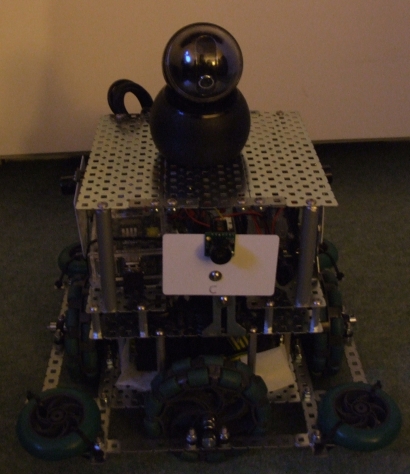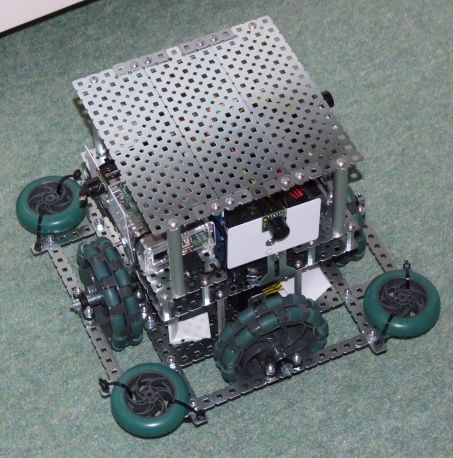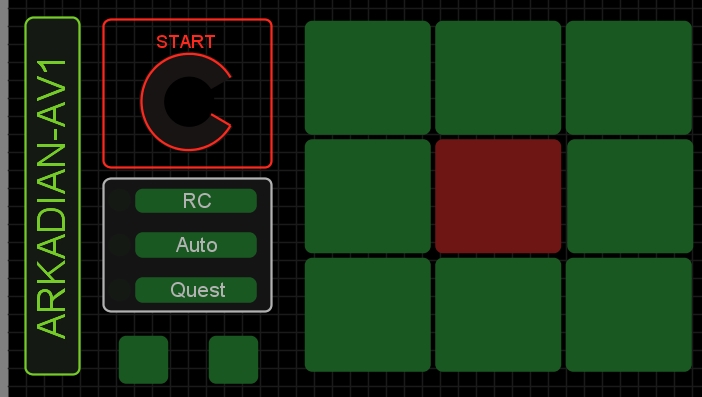import OSC, time, threading, os, serial
import pyfirmata
from pyfirmata import *
from boards import BOARDS
class ArduinoMega(Board):
"""
A board that will set itself up as an Arduino Mega.
"""
def __init__(self, *args, **kwargs):
args = list(args)
args.append(BOARDS['arduino_mega'])
super(ArduinoMega, self).__init__(*args, **kwargs)
def __str__(self):
return 'Arduino Mega %s on %s' % (self.name, self.sp.port)
# Adjust that the port match your system:
PORT = '\\.\COM4' #On Windows
#PORT = '/dev/ttyACM0' #On RPi
# Creates a new board
board = ArduinoMega(PORT)
# ##################################################################
def engine(path, tags, args, source):
print path, "@TAGS", tags, "@ARGS", args, "@SOURCE", source
file = "Car_Start_2.mp3"
print "starting engine"
#os.startfile(file) #
# ##################################################################
def rcMode(path, tags, args, source):
print path, "@TAGS", tags, "@ARGS", args, "@SOURCE", source
print "Switching to RC mode"
#os.startfile(file)
# ##################################################################
def autoMode(path, tags, args, source):
print path, "@TAGS", tags, "@ARGS", args, "@SOURCE", source
print "Switching to AUTO mode"
#os.startfile(file)
# ##################################################################
def questMode(path, tags, args, source):
print path, "@TAGS", tags, "@ARGS", args, "@SOURCE", source
print "Switching to QUEST mode"
#os.startfile(file)
# LIGHTS SECTION
# ##################################################################
PIN2 = board.get_pin('d:2:p')
def lightR(path, tags, args, source):
PIN2.write(1 - args[0])
print path, "@TAGS", tags, "@ARGS", args, "@SOURCE", source
# ##################################################################
# ##################################################################
PIN3 = board.get_pin('d:3:p')
def lightG(path, tags, args, source):
PIN3.write(1- args[0])
print path, "@TAGS", tags, "@ARGS", args, "@SOURCE", source
# ##################################################################
# ##################################################################
PIN4 = board.get_pin('d:4:p')
def lightB(path, tags, args, source):
PIN4.write(1-args[0])
print path, "@TAGS", tags, "@ARGS", args, "@SOURCE", source
# ##################################################################
# ##################################################################
PIN13 = board.get_pin('d:13:p')
def lightFloor(path, tags, args, source):
PIN13.write(1 - args[0])
print path, "@TAGS", tags, "@ARGS", args, "@SOURCE", source
# ##################################################################
# MOTOR SECTION
# ##################################################################
PINA = board.get_pin('d:8:s')
PINB = board.get_pin('d:9:s')
PINC = board.get_pin('d:10:s')
PIND = board.get_pin('d:11:s')
def motor(aa,bb,cc,dd):
print aa, bb, cc, dd
if aa==1: PINA.write(20)
if aa==-1: PINA.write(138)
if aa==0: PINA.write(91)
if bb==1: PINB.write(20)
if bb==-1: PINB.write(138)
if bb==0: PINB.write(91)
if cc==1: PINC.write(20)
if cc==-1: PINC.write(138)
if cc==0: PINC.write(91)
if dd==1: PIND.write(20)
if dd==-1: PIND.write(138)
if dd==0: PIND.write(91)
def xmotor(path, tags, args, source):
direction = path.split("/")[2]
print "PIN", path.split("/")[2], "@TAGS",
print tags, "@ARGS", args, "@SOURCE", source
if args[0]==0:
motor(0,0,0,0)
else:
if direction == "nn" : motor(1,0,-1,0)
if direction == "ne" : motor(1,1,-1,-1)
if direction == "ee" : motor(0,1,0,-1)
if direction == "se" : motor(-1,1,1,-1)
if direction == "ss" : motor(-1,0,1,0)
if direction == "sw" : motor(-1,-1,1,1)
if direction == "ww" : motor(0,-1,0,1)
if direction == "nw" : motor(1,-1,-1,1)
if direction == "freeze": motor(0,0,0,0)
# ##################################################################
# ##################################################################
def user_callback(path, tags, args, source):
user = ''.join(path.split("/"))
print "cb-->", path, "@TAGS", tags,
print "@ARGS", args, "@SOURCE", source
def quit_callback(path, tags, args, source):
#pass
# don't do this at home (or it'll quit blender)
global run
run = False
# tupple with ip, port
receive_address = "192.168.0.47", 7110
# OSC Server. there are three different types of server.
#s = OSC.OSCServer(receive_address) # basic
s = OSC.ThreadingOSCServer(receive_address) # threading
##s = OSC.ForkingOSCServer(receive_address) # forking
s.addDefaultHandlers()
s.addMsgHandler( "/1/start", engine)
s.addMsgHandler( "/1/rc", rcMode)
s.addMsgHandler( "/1/auto", autoMode)
s.addMsgHandler( "/1/quest", questMode)
s.addMsgHandler( "/1/nn", xmotor)
s.addMsgHandler( "/1/ne", xmotor)
s.addMsgHandler( "/1/ee", xmotor)
s.addMsgHandler( "/1/se", xmotor)
s.addMsgHandler( "/1/ss", xmotor)
s.addMsgHandler( "/1/sw", xmotor)
s.addMsgHandler( "/1/ww", xmotor)
s.addMsgHandler( "/1/nw", xmotor)
s.addMsgHandler( "/1/freeze", xmotor)
s.addMsgHandler( "/2/red", lightR)
s.addMsgHandler( "/2/green", lightG)
s.addMsgHandler( "/2/blue", lightB)
s.addMsgHandler( "/2/grey", lightFloor)
s.addMsgHandler( "/ping", user_callback )
s.addMsgHandler( "/quit", quit_callback )
# define a message-handler function for the server to call.
def printing_handler(addr, tags, stuff, source):
print "---"
print "received new osc msg from %s" % OSC.getUrlStr(source)
print "with addr : %s" % addr
print "typetags %s" % tags
print "data %s" % stuff
print "---"
s.addMsgHandler("/print", printing_handler) # adding our function
# just checking which handlers we have added
print "Registered Callback-functions are :"
for addr in s.getOSCAddressSpace(): print addr
# Start OSCServer
print "\nStarting OSCServer. Use ctrl-C to quit."
st = threading.Thread( target = s.serve_forever )
st.start()
try :
while 1 : pass
except KeyboardInterrupt :
print "\nClosing OSCServer."
s.close()
print "Waiting for Server-thread to finish"
st.join() ##!!!
print "Done" |


